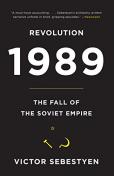BKMT READING GUIDES
Revolution 1989: The Fall of the Soviet Empire
by Victor Sebestyen
Paperback : 498 pages
1 club reading this now
0 members have read this book
Revolution 1989 is the first in-depth, authoritative account of a few months that changed the world.
At the start of 1989, six European nations were Soviet vassal states. By year's end, they had all declared national independence and embarked on the road to democracy. How did it happen so ...
Introduction
(
Revolution 1989 is the first in-depth, authoritative account of a few months that changed the world.
At the start of 1989, six European nations were Soviet vassal states. By year's end, they had all declared national independence and embarked on the road to democracy. How did it happen so quickly? Victor Sebestyen, who was on the scene as a reporter, draws on his firsthand knowledge of the events, on scores of interviews with witnesses and participants, and on newly uncovered archival material. He tells the story through the eyes of ordinary men and women as well as through the strategic moves of world leaders. He shows how the KGB helped bring down former allies; how the United States tried to slow the process; and why the collapse of the Iron Curtain was the catalyst for the fall of the entire Soviet empire.
Victor Sebestyen on Revolution 1989

- The principal reasons the Soviet empire fell was the USSR's disastrous decade-long war in Afghanistan, which is eerily reminiscent of the conflict the West is involved in now. Soviet generals of 20 or 25 years ago were saying almost identical things about their war against the Mujahideen (The Army of God) as NATO soldiers are saying now fighting the Taleban. Just substitute the names and it would be hard to spot the difference. Even more topically, many of the places where battles are being fought now are the same as then.
- Almost nobody predicted the sudden and speedy collapse of Communism--and its defeat was the last war that the West won. Almost nobody in politics, diplomacy, the military, the media or academia saw it coming. Least of all was it predicted by the intelligence agencies.
- Despite trillions of dollars and rubles spent on spying in forty years of Cold War--as well as a vast industry in espionage books and movies--the spooks in the East and West were hopelessly ill informed. The CIA consistently over-emphasized the strength of the Soviet bloc. Even in the Spring of 1989 the then Director of the CIA, Robert Gates, said the Soviets would use force to keep their hold on the East Europe states and, amongst other wrong calls, said the Kremlin would "never" let the Berlin Wall come down. Robert Gates is now US Secretary for Defense.
- Ronald Reagan was a great President, but he is admired for the wrong reasons. The classsic explanation for the collapse of Communism is that Reagan's tough rhetoric against the "Evil Empire" and his arms build-up defeated the Soviets. Quite the opposite is true. We can now take a more nuanced view. When he took a hard line Reagan got nowhere. In fact, it nearly led to a nuclear war by accident. He was successful when he took a soft line and began negotiating with the Russians, in particular with Mikhail Gorbachev. His greatness was in seizing that opportunity--not by ideology. It is hard to see why Reagan is a hero amongst conservatives at all.
- Western bankers did more to bring down Communism than did Presidents or Prime Ministers. Foreign debt forced a crisis in countries like Poland and East Germany and Hungary, which were spending three quarters of their income on paying the interest on loans from the West. The debt crisis--another topical theme now--was a vital factor in the story of 1989.
- The book reveals new information about how the first President Bush tried to slow down the process of change in 1989. He was worried the revolutions were happening so quickly that "global security" was at risk and that some of the East European dissidents were not ready to take power. There is a dramatic scene in the book when George Bush goes to Poland in the summer of '89 to plead with the Communist general in charge of the country to cling on to office for a while longer. ?Victor Sebestyen
(Photo � Stacey Mutkin)
Discussion Questions
No discussion questions at this time.Book Club Recommendations
Recommended to book clubs by 0 of 0 members.
Book Club HQ to over 90,000+ book clubs and ready to welcome yours.
Get free weekly updates on top club picks, book giveaways, author events and more








